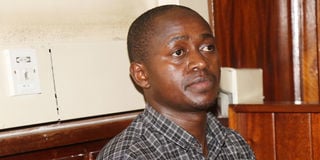Audio, video evidence at issue in Sh177 million Mara varsity heist

Mr Spencer Sankale, the whistleblower in the Maasai Mara university heist when he appeared before the court to testify in the corruption case against the university VC Mary Walingo and four other suspects on 15/11/2022
Prosecutors want to present as evidence audio and video recordings in a corruption case facing top administrators of Maasai Mara University.
The attempt by prosecution witness Spencer Sankale, the whistleblower in the Sh177 million theft scandal, to table the evidence was met with vehement objection from defence lawyers, who said the recordings were illegal.
The gadgets with the evidence included a smart watch and a mobile phone. They allegedly contained audio and video evidence proving communication between Vice-Chancellor Prof Mary Walingo and her accomplices regarding illegal withdrawals of millions of shillings from the university’s coffers.
The other suspects are deputy vice-chancellors Simon Kasaine ole Sano (Administration, Finance and Planning) and John Almadi Obere (Academic and Student Affairs), as well as Finance Officer Anaclet Biket Okumu and her driver Noor Hassan Abdi.
The defense lawyers, led by Steve Biko, demanded that prosecutors produce certificates to identify the gadgets and show that the evidence was obtained in accordance with the law.
Mr Biko argued that his team had not been supplied with the certificates to identify the gadgets.
“What the prosecution needs to do is to prove that they have met the requirements of section 26 of the Evidence Act, which they are yet to do. We object to the admission of the gadgets [because] we do not have the certificates to identify them,” he said.
Prosecutors, however, defended their decision, maintaining that the evidence was legally obtained.
The court heard that the witness obtained the evidence in the course of his work and thus properly meets the constitutional provisions.
“The videos were recorded in relation to the witness’s business at the workplace, which is allowed in law. We are requesting the court to allow us to present them as exhibits as the defense team will get a chance to cross-examine the witness later,” said a prosecution counsel.
Testifying on November 15, Mr Sankale said he purchased the gadgets after a friend advised him to gather evidence of what he suspected to be theft of public funds at the university.
Mr Sankale said Prof Walingo instructed him through her personal assistant to draw up cheques that were not properly accounted for.
The witness, who was at the time the chief finance officer, said the cheques were signed by Prof Walingo and the deputy vice-chancellor for finance.
“It was difficult for me to account for the money because we used blank cheques which were signed by only two signatories,” Mr Sankale said.
He told the court that he at one time contemplated resigning after the withdrawals became consistent before he approached his friend, who advised him against it. The friend allegedly advised him to gather evidence of what was happening.
This is when Mr Sankale decided to purchase the gadgets.
“I downloaded a call recording app and installed it on my Huawei phone and also a smartwatch that could record both audio and video,” he said.
The court will rule on November 18 on whether the gadgets are admissible as evidence.
In the case, Prof Walingo and the four other senior university officers are accused of conspiring to misappropriate Sh177,007, 754 from the university between January 24, 2016 and July 19, 2019.
Prof Walingo faces four other counts of abuse of office and wilful failure to comply with the law relating to the management of public funds.





